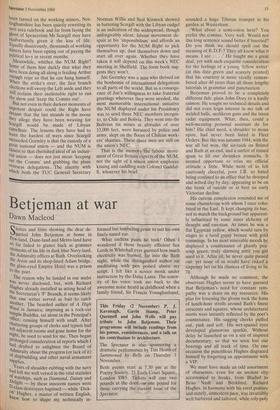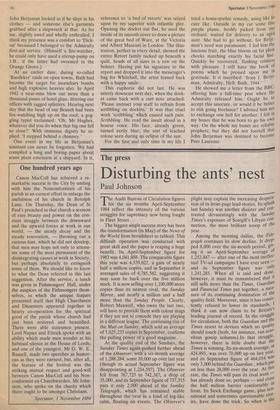Betjeman at war
Dawn Macleod
Stories and films showing the dear de- parted John Betjeman at home in Pew-land, Dune-land and Metro-land have so far failed to glance back at grimmer moments of his life in dark blue Navy-land, the Admiralty offices at Bath. Overlooking the Avon and its shop-lined Adam bridge,
e glass-eyed Empire Hotel was a prison to the poet.
The reason why he landed in our midst Was never disclosed, but, with Richard Hughes already installed as acting head of the Secretariat's `P' Branch, it seems likely that one writer served as bait to catch another. The bearded author of A High Wind in Jamaica, imposing as a rock-cut temple Buddha, sat alone in the Principal's office, censing himself with snuff. After chattering groups of clerks and typists had left adjacent:rooms and gone home for the night, he used to send for me. Then began Prolonged consideration of reports which I had drafted to enlighten the Board of Admiralty about the progress (or lack of it) c'f shipbuilding and other naval armament supplies.
Years of shoulder-rubbing with the navy had left me well versed in the vital statistics of warships, such as Diamond, Dainty and Delight — by these innocent names were class destroyers baptised — while 'Dick- ?if Hughes, a master of written English, new how to shape my technically in-
formed but lumbering prose to suit his own finely-tuned ear.
What endless pains he took! Often I wondered if those brassily efficient Sea Lords in Whitehall ever guessed how much electricity was burned, far into the Bath night, while the distinguished author sat meditating with pen poised above my script. I felt like a novice monk under instruction by the Dalai Lama. The sonor- ity of his voice took me back to the awesome noise heard in childhood when a family friend, Sir Francis Younghusband This Friday (2 November) P. J. Kavanagh, Gavin Stamp, Peter Quennell and John Wells will pay. tribute to John Betjeman. Their programme will include readings from his poems, reminiscences, and a talk on his contribution to architecture.
The Spectator is also sponsoring a dramatic performance by Tim Heath of Summoned by Bells on Thursday 1 November.
Both events start at 7.30 pm at the Poetry Society, 21 Earls Court Square, London SW5. Tickets will cost two pounds at the door, or one pound for those carrying the current issue of the Spectator.
sounded a huge Tibetan trumpet in his garden at Westerham.
'What about a semi-colon here? You prefer the comma. Very well. Would not this long sentence sound better if bisected? Do you think we should spell out the meaning of R.D1F.? They all know what it means. I see . . . .' He taught me a great deal, yet with such exquisite consideration for the feelings of a young 'fellow writer' (at this date green and scarcely printed) that his courtesy is more vividly remem- bered after 40 years than all those lengthy tutorials in grammar and punctuation.
Betjeman proved to be a completely different fish: plain John Dory to a lordly salmon. He sought no technical details and did not even feign interest in my talk of welded hulls, oerlikeon guns and the latest radar equipment. What, then, could a well-meaning personal assistant do for him? His chief need, a shoulder to moan upon, had never been listed in Fleet Orders. But this was autumn 1944, with the war all but won, the air-raids on Bristol and Bath at an end, and a surfeit of tinned spam to fill our shrunken stomachs. It seemed opportune to relax my official attitude a little. While most of us felt cautiously cheerful, poor J.B. so hated being confined to an office that he drooped and wilted day by day, appearing to be on the brink of suicide or at best an early Victorian decline.
His curious complexion reminded me of some chameleons with whom I once coha- bited in the East. It kept changing its hue, not to match the background but apparent- ly influenced by some inner alchemy of thought and emotion. At times he was a flat 'Egyptian yellow, which would turn by stages to a lurid gypsy bronze with gold trimmings. In his most miserable moods be displayed a countenance of ghastly pea- soup green, truly alarming until you got used to it. After all, he never quite passed out: yet none of us would have risked a sixpenny bet on his chances of living to be 78.
Although he made no comment, the observant Hughes seems to have guessed that Betjeman's need for constant sym- pathy was a drain on my resources. His plan for lessening the gloom took the form of lunch-hour strolls around Bath's finest crescents and squares, whose architectural merits were instantly reflected by the poet's countenance. His sagging cheeks puffed out, pink and soft. His wet-spaniel eyes developed glamorous sparkle. Without delay he launched us on a sea of inspired documentary, so that we soon lost our bearings and all track of time. On one occasion the punctilious Hughes disgraced himself by forgetting an appointment with a VIP.
We must have made an odd assortment of characters, even for an ancient city accustomed to freaks, from Bladud to Beau Nash and Beckford. Richard Hughes, in harmony with his erect posture and stately, unmodern pace, was invariably well barbered and tailored, while roly-poly John Betjeman looked as if he slept in his clothes — and someone else's garments grabbed after a shipwreck at that. As for me, slightly awed and wholly enthralled, I think my presence was a comfort to 'Dick- on' becaused I belonged to the Admiralty first-aid service. (Himself a fire-watcher, he could only have used a stirrup-pump on J.B., if the latter had swooned in the Orange Grove.) At an earlier date, during so-called 'Baedeker' raids on open towns, Bath had become the target for incendiary bombs and high explosive heavies also. In April 1942 a near-miss blew out more than a thousand panes of hotel glass, littering our offices with jagged splinters. Hearing next day that the head of our Branch had been fire-watching high up on the roof, a gog- gling typist exclaimed: 'Oh, Mr Hughes, whatever did you do when that big one fell so close?' With immense dignity he re- plied: 'I stepped behind a chimney.'
One event in my life as Betjeman's assistant can never be forgotten. We had compiled a long and boring paper about some plant extension at a shipyard. In it, reference to 'a bed of retorts' was seized upon by my superior with infantile glee. Opening the docket out flat, he used the inside of its smooth cover to draw a picture of the great bed of Ware, at the Victoria and Albert Museum in London. The illus- tration, perfect in every detail, showed the entire Retort family tucked up beneath a quilt, heads of all sizes in a row on the bolster. Having put his signature to the report and dropped it into the messenger's bag for Whitehall, the artist leaned back with a happy smile.
This euphoria did not last. He was utterly downcast next day, when the dock- et came back with a curt note attached: `Please instruct your staff to refrain from scribbling on dockets.' It was that cruel work 'scribbling' which caused such pain. Scribbling. He read the insult aloud in a hoarse voice. His face, already green, turned eerily blue, the sort of leached colour seen during an eclipse of the sun.
For the first and only time in my life I
tried a homeopathic remedy, using like to cure like. Outside in my car some fine purple plums, freshly picked from our orchard, waited for delivery to an aged aunt. She had to go without, for BetJe- man's need was paramount. I fed him the luscious fruit, the blue bloom on fat plum cheeks matching exactly his facial hue. Quickly he recovered, flushing crimson with pleasure. I still have the book of poems which he pressed upon me in gratitude. It is inscribed: 'from J. Betje- man, Admiralty, Hell, Bath, 1944.'
He showed me a letter from the BBC, offering him a full-time post when the Admiralty released him. Ought he to accept this sinecure, or would it be better to risk going freelance? I advised him not to exchange one hell for another. I felt in my bones that he was born to go his own way. On the whole my bones are reliable prophets; but they did not foretell that John Betjeman was destined to become Poet Laureate.











































 Previous page
Previous page